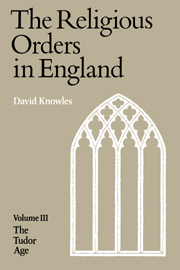Book contents
- Frontmatter
- Contents
- Preface
- List of Abbreviations
- Part One The Tudor Scene
- Part Two The Gathering Storm
- Part Three Suppression and Dissolution
- Chap. XVI Before the Dissolution
- Chap. XVII The end of the Observants
- Chap. XVIII Syon
- Chap. XIX The London Charterhouse and its sister houses
- Chap. XX The economy of the monasteries in 1535
- Chap. XXI Servants, almsgiving and corrodians
- Chap. XXII The visitation of 1535–6
- Chap. XXIII The Act of Suppression and the case for the defence
- Chap. XXIV The dissolution of the lesser houses
- Chap. XXV The Northern Rising
- Chap. XXVI The last phase
- Chap. XXVII The attack on the greater houses
- Chap. XXVIII The suppression of the friars
- Chap. XXIX The cankered hearts
- Chap. XXX The transformation of the buildings
- Chap. XXXI The new cathedrals and colleges
- Chap. XXXII The disposal of the lands
- Chap. XXXIII The treatment of the dispossessed
- Part Four Reaction and Survival
- Appendix I Sir Thomas More's letter ‘to a monk’
- Appendix II Religious houses suppressed by Cardinal Wolsey
- Appendix III The witness of the Carthusians
- Appendix IV Houses with incomes exceeding £1000 in the Valor Ecclesiasticus
- Appendix V The sacrist of Beauvale
- Appendix VI Itinerary of the visitors, 1535–6
- Appendix VII The commissioners for the survey of the Lesser Houses in 1536
- Appendix VIII The conflict of evidence on the monasteries
- Appendix IX The last abbots of Colchester, Reading and Glastonbury
- Appendix X Regulars as bishops
- Bibliography
- Index
Chap. XVI - Before the Dissolution
Published online by Cambridge University Press: 08 January 2010
- Frontmatter
- Contents
- Preface
- List of Abbreviations
- Part One The Tudor Scene
- Part Two The Gathering Storm
- Part Three Suppression and Dissolution
- Chap. XVI Before the Dissolution
- Chap. XVII The end of the Observants
- Chap. XVIII Syon
- Chap. XIX The London Charterhouse and its sister houses
- Chap. XX The economy of the monasteries in 1535
- Chap. XXI Servants, almsgiving and corrodians
- Chap. XXII The visitation of 1535–6
- Chap. XXIII The Act of Suppression and the case for the defence
- Chap. XXIV The dissolution of the lesser houses
- Chap. XXV The Northern Rising
- Chap. XXVI The last phase
- Chap. XXVII The attack on the greater houses
- Chap. XXVIII The suppression of the friars
- Chap. XXIX The cankered hearts
- Chap. XXX The transformation of the buildings
- Chap. XXXI The new cathedrals and colleges
- Chap. XXXII The disposal of the lands
- Chap. XXXIII The treatment of the dispossessed
- Part Four Reaction and Survival
- Appendix I Sir Thomas More's letter ‘to a monk’
- Appendix II Religious houses suppressed by Cardinal Wolsey
- Appendix III The witness of the Carthusians
- Appendix IV Houses with incomes exceeding £1000 in the Valor Ecclesiasticus
- Appendix V The sacrist of Beauvale
- Appendix VI Itinerary of the visitors, 1535–6
- Appendix VII The commissioners for the survey of the Lesser Houses in 1536
- Appendix VIII The conflict of evidence on the monasteries
- Appendix IX The last abbots of Colchester, Reading and Glastonbury
- Appendix X Regulars as bishops
- Bibliography
- Index
Summary
THE OUT LOOK OF THE AGE
Before embarking upon a narrative of the events leading to the dissolution of the monasteries, it may be permissible to note some characteristics of Tudor society which in the past have often been overlooked by those unacquainted with the age.
One such characteristic is that the modern tradition of public service, and even the outlook of a mechanical impersonal bureaucracy, had not yet come into existence. The agents of government great and small, from an Audley or a Cromwell downwards, were the servants of their immediate superior who might be the king himself or a minister directly appointed by him. They had their living and their career to make, and this could only be done by executing his commands and meeting his wishes; to suppose that they had any of the modern civil servant's or police officer's sense of duty to the public is to transfer the outlook of the present day to an age which had another way of regarding life. The same consideration applies, mutatis mutandis, to the holders of all other positions or offices that are to-day considered of trust or ‘public’, such as those of members of parliament, lawyers or even the judiciary. Among men of these classes there was a complete absence of the ethical conventions or the professional etiquette of their modern counterparts, save perhaps among men of the law when the issue was between private parties. All were the servants, mediate or immediate, of the king.
- Type
- Chapter
- Information
- The Religious Orders in England , pp. 195 - 205Publisher: Cambridge University PressPrint publication year: 1979

